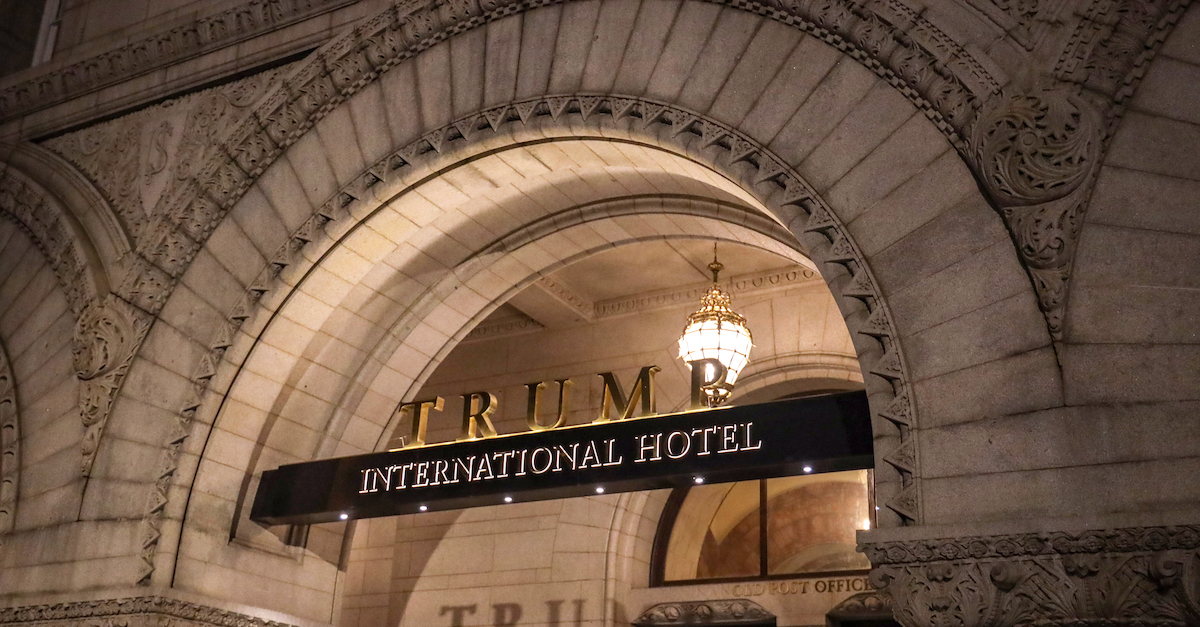
A federal court affirmed the dismissal on Friday of a Washington, D.C. restaurant’s lawsuit, which alleged President Donald Trump’s assumption of office created an unfair business advantage for the Trump International Hotel.
The claim:
Cork noticed that the competitive balance shifted toward the Hotel after the 2016 election, when the Hotel began to attract more of the lobbyists, advocacy groups, and diplomats that Cork had relied on to fill its event calendar. Cork alleges that these customers chose the Hotel because of a “perception” that patronizing the Hotel “would be to their advantage in their dealings with” the Trump Administration. President Trump and his associates have encouraged and advanced this perception by, among other things, using the President’s surname as the Hotel’s logo and promoting the Hotel during press conferences and meetings with government officials. As a result, “foreign dignitaries have . . . flocked to the Hotel.”
In short, after Trump was elected Cork saw a downturn in business because people started doing more business at the Trump Hotel, in order to curry favor with the administration and enrich themselves.
Cork Wine Bar initially filed the lawsuit in the District of Columbia Superior Court back in 2017, “alleging violations of the District’s common law of unfair competition.” But President Trump successfully had the case removed to federal court–the U.S. District Court for the District of Columbia. There, George W. Bush appointee Judge Richard Leon dismissed the lawsuit for failure to state a claim. An appeal followed, but the U.S. Court of Appeals for the District of Columbia Circuit unanimously affirmed the dismissal on Friday.
Judge Thomas Griffith penned the opinion; the case was also heard by Merrick Garland and Stephen Williams.
“President Trump characterizes Cork’s suit as an action ‘for or relating to’ the act of simply holding office. He argues that his position as President is ‘a necessary condition for Cork’s theory of liability,’ and that his ‘assumption of office is what caused the alleged unfair competition to begin,'” Griffith wrote. “We agree.”
“The fact that Donald Trump is President is indispensable to Cork’s claim. Cork’s complaint expressly targets ‘the unfair advantage that the Trump International Hotel . . . has gained from Defendant Donald J. Trump being the President of the United States,'” the judge continued. “Indeed, Cork conceded at oral argument that its unfair-competition claim is ‘based entirely’ on President Trump’s status as a federal officeholder.”
The court determined that the district court was right to dismiss to case for failure to state a claim.
Cork makes no meaningful attempt to square its unfair- competition claim with District law. The gravamen of Cork’s complaint is that so long as the President retains a stake in the Hotel, Cork cannot fairly compete, because of the ‘perception’ that Hotel patrons will receive favorable treatment from the Trump Administration. Although Cork suggests in passing that President Trump and the Hotel are ‘impair[ing]’ competition and ‘interfer[ing] with access’ to its business, its claim bears little resemblance to the examples listed in Ray and B & W Management, and Cork cites no case showing that the allegations here fall into those categories of unfair competition.
Given Cork’s failure to cite any contrary precedent, we see no reason to conclude that District common law recognizes anything like Cork’s unfair-competition claim.
The Cork legal team released a statement in response to the decision. Mark Zaid, one of the attorneys who represented the Ukraine whistleblower, said that the “operation of a for-profit hotel by an elected leader is plainly the type of corruption that the rule of law should prevent.”
You can read the rest of the opinion below:
Cork Wine Bar lawsuit dismissed by Law&Crime on Scribd
[Image via Alex Wroblewski/Getty Images]
Have a tip we should know? [email protected]